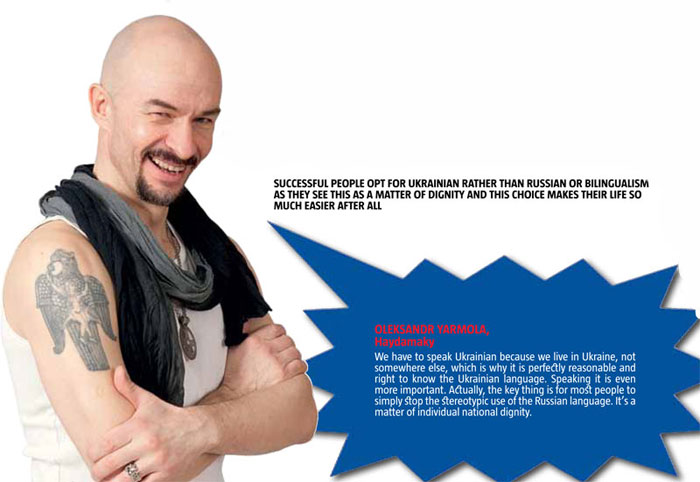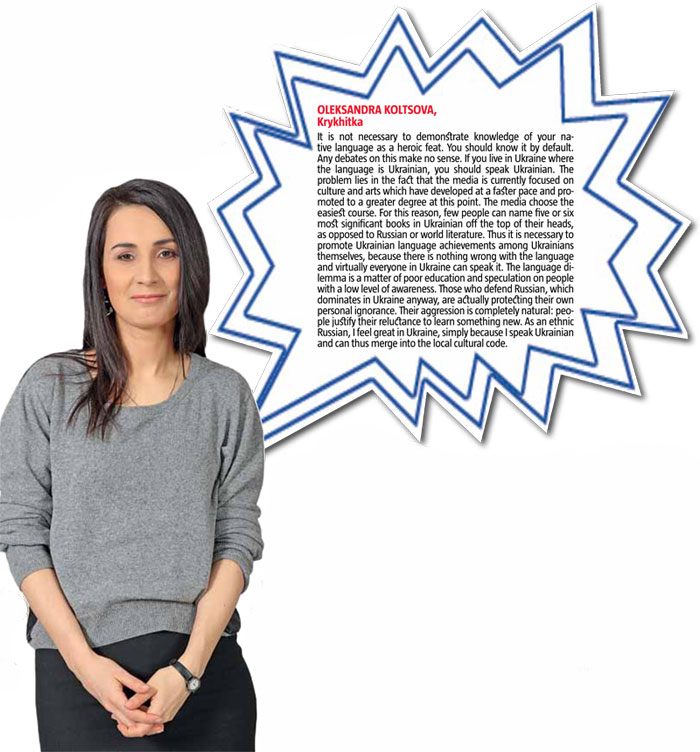We were taught to be polite. “Answering people in the language they speak to you in is a sign of politeness,” teachers would tell us over and over again in school. We have grown into very well-mannered adults and politely switch to Russian with our Russian-speaking colleagues, friends and the people we meet in the street, as if they do not understand our Ukrainian. The latter is for special occasions: some speak it at home, others – for official celebrations. The language that people speak wherever they are is a personal choice. However, on the nation-wide level, this “language flexibility” can be seen as a threat: if every Ukrainian switches into Russian whenever addressed in it for the purpose of politeness, who will speak Ukrainian? There is also a limit to good manners.
Oksana Polishchuk lives in Zhytomyr. Her younger brother encouraged her to make a conscious switch to Ukrainian. At that time, she was in the 8th grade and only spoke Russian to her friends. Her native Ukrainian was for her parents and teachers. “My brother once heard me talking to my friend,” Oksana shares. “We’re not Ukrainians, he said. Why do you think that, I asked him. Because you and the people in the street speak Russian, the five-year old replied. It was like cold shower,” she recollects. From that time on, every time she switched to Russian, Oksana felt like a traitor, so she decided to stop. It was hard at first. Surprised, her classmates mocked her. “I often heard things like, stop fooling around, speak a normal language,” she says. “My parents, as well as my history and Ukrainian language teachers supported me, although I remained a “maverick” until my graduation. But I didn’t care any more, I had different priorities and values,” Oksana comments.

Anvar Azizov of Uzbek and Ukrainian origin lives in Kyiv. Five years ago he switched to Ukrainian completely, even with his Russian-speaking parents. He had been thinking about it for a while, but he lacked the spirit as well as the knowledge of Ukrainian. His concern about how others would react to this was another discouraging factor. Anvar finally went to the Carpathians where he had a chance to practice his Ukrainian and gain the courage to speak it in the city of his birth. Since his return, he has been speaking exclusively in Ukrainian on public transport, in shops and to people on the streets. It took him about three months to get used to the new language and for his friends and family to get used to the “new” Anvar. “The stereotypes and habits gradually crumbled ,” he says. “I had to keep myself under control at all times, in order to use Ukrainian automatically in any given situation.” Sometimes, people thought Anvar was from somewhere other than Kyiv. “A man I talked to on the underground couldn’t believe there was such thing as a Ukrainian-speaking person, born to a Russian-speaking family in Kyiv,” Anvar says. “He could not conceive that someone could shape the environment rather than be shaped by it.”
Some people choose Russian because they think it offers them better prospects or makes them look “cool” in the eyes of the people in their environment. For Anvar Azizov, the opposite applies; he is happy to be able to speak, write and create in Ukrainian since switching from Russian. Also, he no longer swears. “I became softer,” he says. “although I’m not sure if this has anything to do with the language, but Ukrainian definitely has a gentler sound than Russian.” His transformation began with using Ukrainian-language software, reading Ukrainian-language books and writing his songs in Ukrainian.
Larysa Masenko, a sociolinguist, draws a clear line between official and individual bilingualism. “Official state bilingualism in a country is always dangerous, because it could be the basis for a nation to split apart. Most European states were established on the basis of one language, shaped by its culture and the awareness of the people of its common historical memory,” says Ms. Masenko.
These three components must be present to reinforce a national state. Since Ukrainians inherited a russified state, first and foremost, they need a language policy which would protect the state language and promote its wider use. “The key objective is to get new generations to move away from bilingualism through education, and get the situation back to normal in one or two generations,” she claims.

By dropping their post-colonial ballast, nations made a significant leap in terms of economic and socio-cultural development. The Czech Republic is one example: at the beginning of the previous century most of its population spoke German, but the country was able to overcome this problem within 50 years. Urban Finns spoke Swedish for quite a while, too. For Ukraine, a critical mass of linguistically stable Ukrainian-speakers is crucial. “That’s when a language is preserved,” Ms. Masenko says. By contrast, the ongoing switching from one language to another breaks the language code and turns both languages into a weird mixture of the two.

